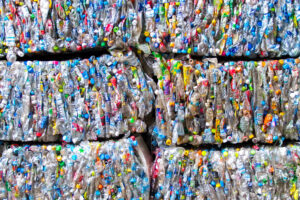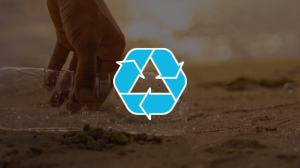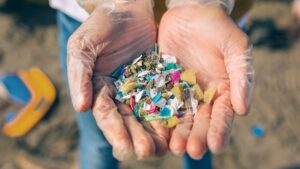Plastic pollution adds to Air Pollution
Indians generate approximately 15,000 tonnes of plastic waste per day and the management of it is very poor. Much of it is burned, which gravely affects air quality.
Full Article
Samriddhi Srivastava
New Delhi: The amount of plastic garbage increases as the population grows, and disposable plastic products, like wet wipes, coffee cups, drinks bottles, sweet wrappers and other packets, accumulate over time. In India, we generate around 15,000tonnes of plastic waste per day and is growing every day. As per a study conducted by the Central Pollution Control Board (CPCB) in few major cities of the country, it has been observed that around 4,059 tons of waste is generated on per day basis.
Big players of consumer-goods such as Unilever and Procter & Gamble pledged to use more recycled plastics for their products in order to initiate change for sustainable future. As the concern over plastic waste increases around the world, scientists, entrepreneurs and engineers have begun to come up with solutions that could help our planet to survive for the coming generations. Slow but effective development can be seen as some are coming up with methods for recycling plastics, while on the other hand few are developing products that are safe and biodegradable in niche segments.
Ms. Rishu Gandhi, Founder, Mother Sparsh says “In Consumer goods category wet wipes are 3rd largest contributor of plastic based pollution in the world, it takes centuries for these 80% polyester-based wipes to degrade. To tackle the plastic pollution, we as brands need to go organic like what we did with our offerings which started with natural and eco friendly products line of wipes in the market.” In India, with over 1.5 million births every month we are doubling the consumption of wet wipes every month with the increasing population. To add to the concern, Waste management is itself a problem in India hence, plastic waste management is very poor. These plastic wastes are either burned releasing toxic gases, buried to degraded over centuries or thrown in our oceans to make them more polluted and harmful for oceans ecology. According to Social Activist Mr. Vneet P Yadav,
“Plastic is a concern for environment specially for humans if we burn it, it never gets burnt completely and release harmful gases like styrene which affects eye & mucous membranes, central nervous system. Dioxin which is a carcinogen and hormone disruptor also is emitted in the air which gets settled on our crops and water thus into our food. Dioxin also gets accumulated on body fat and passed on to babies of expectant mothers. Hence, a useful invention has been abused so much that it has become a concern for the planet.”
To add to that, scientists have found that micro plastics which can not be seen are getting mixed in our air and water. Given the state of Indian infrastructure, we have successfully added micro plastics as a pollutant in the long list of chemicals and particulate matter. A report from UK suggested that we inhale around 130 tiny plastic particles in a day, so the situation is much more alarming if we look at the Indian scenario where air quality refuses to leave severely polluted category. “We are breathing polluted air induced with harmful chemicals and gases.
We as human beings are completely oblivious of the fact that we inhale plastic substances every day, which makes way to our lungs – causing us serious health issues. We need to understand that outdoor air pollution is not only endangering our lives but even indoor air pollution is contributing to this menace.” Said Mr. Rohit Bansal, AQI Expert & Founder, aqi.in. Plastic has proven to be a resilient opposition in terms of pollution of air, water and land. Whether it is visible or invisible the plastic waste is here to stay and we as humans are not just using plastics but are carrying plastic in our bodies which is an alarming sign. Hence, Government has to work more aggressively towards this problem before it becomes hard to contain.



